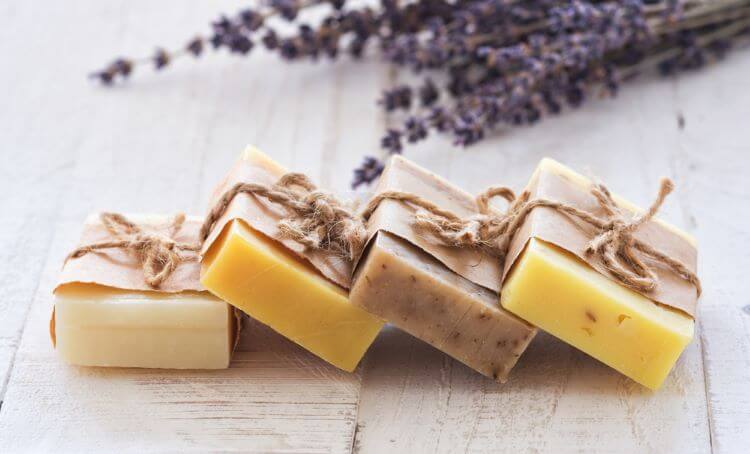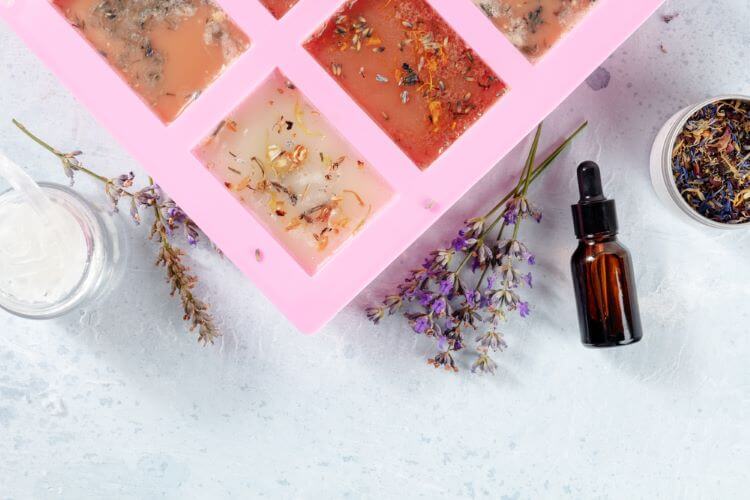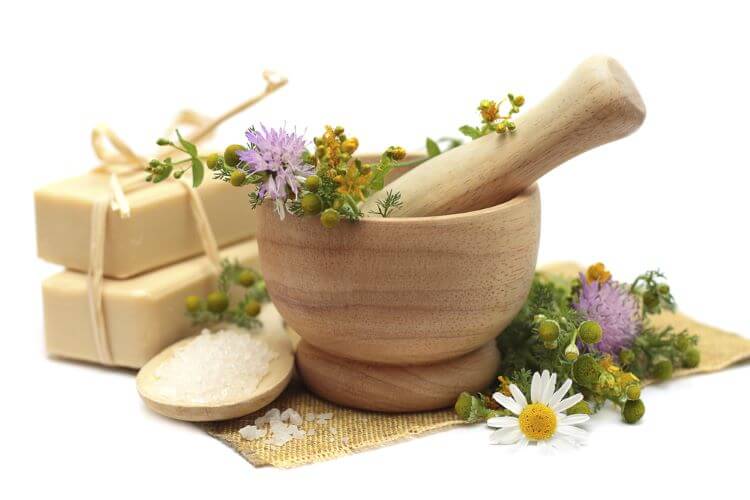Herbal products are organic products that are made from plants and natural ingredients and are useful and healthier for the skin. These soaps have a less damaging effect on the skin. Most people complain of dry skin after washing with soap. Herbal soaps use the properties of herbal and natural materials to solve this problem. If you don’t know exactly what herbal soap is, what properties it has and what are its types, stay with us until the end of this article.
History of using herbal soaps

The use of these soaps dates back to about 2800 years before Christ. At that time, the Romans used rainwater, animal fat and coal ash to make a mixture that had the ability to disinfect and clean. These soaps were used to remove grease stains, wash clothes, wash hands and generally clean.
Over time, other ingredients were added to this composition so that herbal soaps reached their present form. Today, the use of soaps is not only limited to washing hands and face and is also used in many cases such as the production of cosmetics and health products, spinning and even plasticizing.
Today, the main reason for using ash in the production of old herbal soaps has been identified. This alkaline substance contains sodium carbonate and shows its cleaning properties when combined with fats. Although ash is not used in today’s soaps, fats and sodium carbonate or their substitutes are still seen in soap ingredients.
What are the properties of herbal soap?

These soaps are completely free of chemicals and preservatives and instead contain natural oils such as almond oil, castor oil, argan oil, olive oil, coconut oil, vitamin E, aloe vera, etc. For this reason, not only do they not have side effects or damage to the skin, but they are also very beneficial for the skin. Depending on the ingredients used in each herbal soap, its properties will also be different.
Some of the benefits and properties that these soaps have for the skin are:
- Reducing the amount of toxins absorbed through the skin
- Whitening and brightening
- Deep cleansing of the skin
- Protect the skin from chemicals
- Contains natural ingredients and vegetable oils
- Skin smoothing, rejuvenating and wrinkle removal
- Maintaining moisture and preventing skin dryness
- Without causing sensitivity
- Strengthening and nourishing the skin
- Helping to solve skin problems such as blemishes, pimples and acne
- Improve skin health
- Adjusting the pH of the skin
- No harm to the environment
- Very diverse and suitable for all kinds of tastes
What is the difference between non-vegetable soap and herbal soap?
As can be seen from the names of these two types of soap, the main difference between these two products is the use of vegetable and natural oils. In fact, it can be said that the main and basic material of both of these is fixed. If a certain amount of vegetable oils is added to this main ingredient, it is called vegetable soap. This seemingly simple work adds new properties and benefits to the final product.
Types of herbal facial soap

There are different types of soaps that should be chosen depending on the skin type of each person. Each person’s facial skin secretes a certain amount of fat; This amount is less in some people and more in others. Based on this, the facial skin is divided into five groups as follows:
- Dry skin: People with dry skin usually feel stretched, dry and cracked after every wash. In some severe cases, there is a possibility of its scaling and scattered scaling.
- Oily skin: Oily skin is the exact opposite of dry skin. People with this type of skin still feel oily even after washing. The pores of the skin of these people secrete more oil than usual, and for this reason, its surface is often shiny.
- Normal skin: People with normal or normal skin have normal skin oil and do not feel greasy, dry or stretchy after washing. These people have the best and healthiest type of skin, which dries up with repeated washing and becomes oily if not washed on time.
- Mixed skin: Mixed skin is a combination of oily and normal skin, with oily skin on the forehead and on the septum of the nose, and dry skin on the chin and cheeks.
- Sensitive skin: Sensitive skin needs more care and it is not possible to use some cosmetics or health products for these people. Sensitive skin reacts quickly when exposed to some products that have a high impact power and itches and reddens or other allergy symptoms.
According to the mentioned explanations, now you know that each type of skin needs a specific type of soap with different effectiveness. In this way, the types of herbal soap according to their use are:
- Suitable for dry skin
- Suitable for normal skin
- Suitable for oily skin

Herbal soap suitable for dry skin
According to the characteristics of dry skin, suitable soaps for these people should be mild and contain hydrating and moisturizing ingredients such as glycerin. In this way, the moisture needed by the skin is provided to a large extent and excessive dryness and cracking of the skin after washing is prevented.
Herbal soap suitable for oily skin
On the other hand, herbal soaps are suitable for oily skin. These people should use soaps that are harder and contain more mineral compounds and chemicals in their production. Also, considering that these people are more exposed to pimples and acne than others, it is better to use soaps containing anti-acne and antibacterial substances.
Herbal soap suitable for normal skin
People with normal skin can use any soap to wash their skin and there are no restrictions on this. The only noteworthy point regarding these people is the result of using soap in the long term. If you feel that your skin is a little dry after using soap several times or, on the contrary, it does not wash well, you should use another cleanser for your skin.
Introducing some skin lightening herbal soaps

Air pollution, sunburn, internal body problems, accumulation of dead skin cells, etc. are among the factors that make your skin look darker than it is. Skin lightening herbal soaps simply solve this problem. In the following, we have introduced some examples of these products along with their main properties:
Turmeric herbal soap
- Skin brightener
- Natural anti-stain soap
- Prevent skin dryness
- Reduction of subcutaneous acne
- Reduce inflammation
- skin Cleaning
- Fix the boil
Chamomile herbal soap
- Disinfectants
- Skin brightener
- Herbal anti-stain soap
- Reduction of subcutaneous acne
- Heals skin inflammations
Almond face soap
- Skin brightener
- Herbal anti-stain soap
- Treatment of dry skin
- Rich in minerals
- Skin strengthening and anti-allergy
Herbal soap for hair
Just as the properties of different plants for the skin are different from each other, this point should also be taken into account when choosing herbal soap for hair.
Cedar and henna have anti-dandruff and anti-fungal properties and help strengthen hair. Wheat germ strengthens hair and increases its elasticity. It is better to use a hair straightener to remove frizz and increase the strength of its texture.
How to prepare herbal soap?
From the beginning of the article until now, we investigated what herbal soap is, its types and the properties of the most common plants used for this purpose. In relation to the preparation of this product, we must say that these soaps are generally prepared in two ways: handmade and corporate.
Handmade herbal soap
This batch is prepared individually and by hand. For this reason, it is possible to customize and determine its composition according to the needs of each person’s skin.
Corporate herbal soap
The second category is widely produced in series and in production lines.





No views